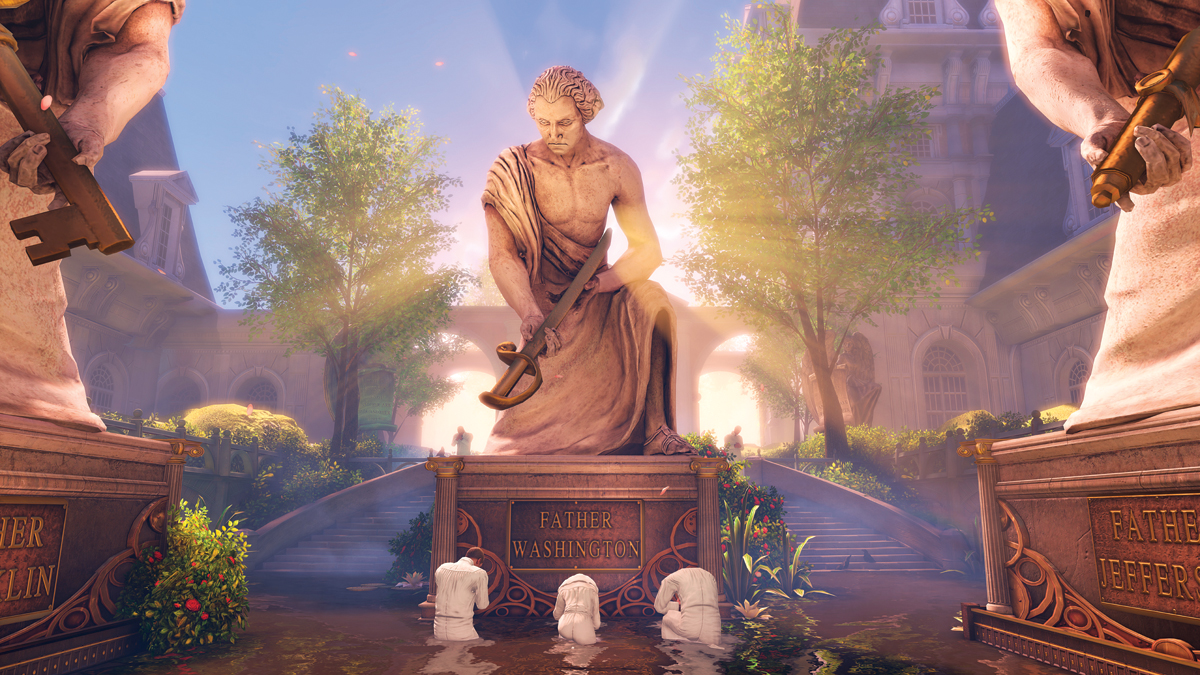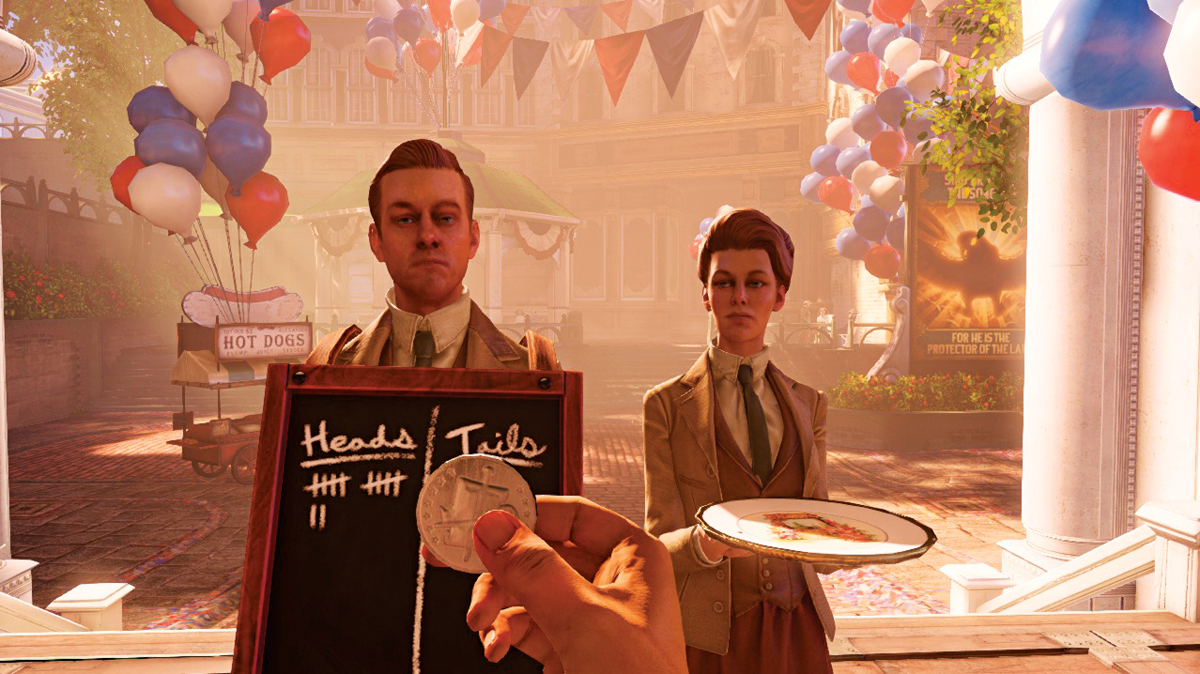Game Changer: Kevin Levine

Screengrab via Irrational Games
Visually, Infinite is stunning. Unlike the murky underwater metropolis of the original game, Infinite’s cloud city of Columbia is a place of blue skies and green parks, with cream-colored buildings bobbing in mid-air. Where the original BioShock’s dystopia had been founded on Randian libertarianism, Infinite’s is built on a strain of super-patriotic, race-obsessed religious fanaticism that many took as a parody of the Republican Tea Party—a charge Levine denies. “Themes tend to repeat themselves,” Levine said. “We started this game before there was a Tea Party…. People probably thought we were trying to make a point about racism. We were just trying to depict a period.”
Infinite’s depiction of religiosity run amuck was controversial with some players. One of them, Breen Malmberg, demanded his money back because of a scene in the game’s opening sequence in which the player must undergo a forced baptism to enter the city. It’s presented in the game as a choice—the player has to click on an “Accept Baptism” prompt—but there is no other alternative: You either undergo baptism, or you don’t play the rest of the game. “I am basically being forced to make a choice between committing extreme blasphemy by my actions in choosing to accept this ‘choice’ or forced to quit playing the game before it even really starts,” Malmberg, a devout Christian, told the gaming website Kotaku. Online commenters pointed out the obvious irony: For Malmberg, virtual baptism was an outrage, but he seemed to have no problem contemplating the countless virtual murders that would come later in the game.
For all its beauty, Infinite is disturbing. One of the main character’s most popular weapons is a handheld chain-saw glove that can core a head like a piece of rotted fruit. Even hard-core gamers commented on Infinite’s bloodshed. Chris Plante, of Polygon, wrote: “The magnitude of lives taken in BioShock Infinite, and the cold efficiency in doing so, is unfamiliar to even the most exploitative films…. Violence doesn’t serve BioShock Infinite. It distracts from it.”
“BioShock Infinite is in many ways so, so close to being That Game,” wrote Kotaku’s Kirk Hamilton, “the one we can show to our non-gamer friends and say ‘See? Look at this! It is so awesome! Check out the story! It’s like LOST! How neat is this?’ But it’s not That Game, because it’s so hilariously, egregiously violent that a large number of people will never give it a chance.”
In fact, the game’s violence struck some critics as so over the top, and so distracting from an otherwise lushly imagined fictional world, that they started asking a hitherto-unasked question: Why should games like Infinite include violence at all? Why are they still built on the old Pac-Man model of collecting points and beating baddies?
To put it another way, as the games journalist Stephen Totilo asked Levine in February: “Why is it that a studio that thinks about really interesting themes…why is it that a studio that is highfalutin enough and interesting enough to do that, is also a studio that makes first-person shooters?”
Levine replied at length, but didn’t have an answer. “I would say it’s an evolutionary form as we figure out more and more,” he said. “But this is an art form that is incredibly new.”

Screengrab via Irrational Games
It’s a sentiment he repeated in an interview with Boston magazine: “It’s exciting to me to be at the beginning of something,” Levine said. “What’s interesting about games is how little we know about how to make them. We’re falling on our faces all the time.”
“Infinite’s been successful in creating dialogue, but not all of that dialogue is complimentary,” said Philip Tan, of the MIT Game Lab. “It’s incredibly valuable when one game comes out that everyone’s talking about. It gives us a central, common experience that we can use to discuss what is possible in games today.”
Rus McLaughlin, of GamesBeat, commented that a video game’s imagined world is the only proper place to demonstrate violence. “[Infinite] is intelligently written and smartly executed,” McLaughlin said. “That made a lot of industry people want to hold it up as an example of what games can be. They wanted it to be something that could break the ‘mindless video game’ perception that’s so strong in peoples’ minds.”
Games writer Leigh Alexander criticized Infinite for not following through on that expectation. “The player had no opportunity to experience empathy or to explore those systems [of race and religion] in a way that commented on them meaningfully,” Alexander said. “Ideas about systemic prejudices go from provocative to offensive when they’re forced only to be a backdrop, when the extremists just become uninteresting caricatures.”
This summer, the movie trades announced that Levine had been tapped to write a film reboot of Logan’s Run for Warner Brothers. The first Logan’s Run movie, out in 1976, is about an aging man who tries to escape his society, which kills people when they turn 30. It is a story of false utopia that Levine has loved since childhood. Long after his first effort at Hollywood, he has returned.
But at the same time, he has been working on the rollout of a final BioShock chapter: BioShock: Burial at Sea, a downloadable addition that takes players back to the underwater city of the original game. Is it art? Who knows, but it’s damn good fun.


